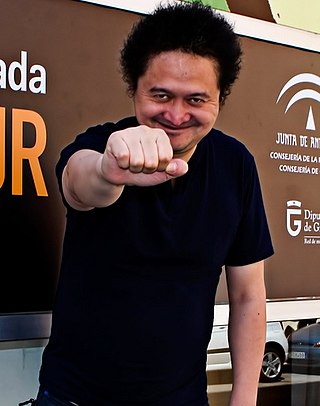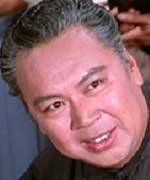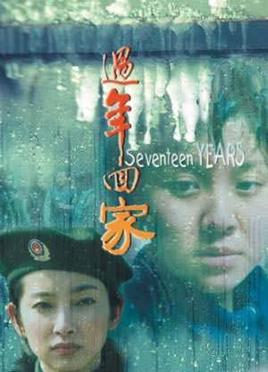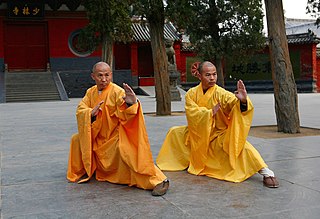Related Research Articles

Yuen Woo-ping is a Hong Kong martial arts choreographer and film director who worked in Hong Kong action cinema and later Hollywood films. He is one of the inductees on the Avenue of Stars in Hong Kong. Yuen is also a son of Yuen Siu-tien, a martial arts film actor.

Zhang Yuan is a Chinese film director who has been described by film scholars as a pioneering member of China's Sixth Generation of filmmakers. He and his films have won ten awards out of seventeen nominations received at international film festivals.

Great Wall Movie Enterprises Limited was Hong Kong's leading left-wing studio and one committed to making progressive Mandarin films with social content as well as entertainment value.

Lo Wei was a Hong Kong film director and film actor best known for launching the martial arts film careers of both Bruce Lee, in The Big Boss and Fist of Fury, and Jackie Chan, in New Fist of Fury.
Zhang Ji, courtesy name Derong, was an official who lived during the late Eastern Han dynasty and early Three Kingdoms period of China. During the Battle of Tong Pass, Zhang Ji, Xiahou Yuan and others defended the city of Chang'an from attacks by the warlord Ma Chao and his allies. From 213 to 220, Zhang Ji served as the Inspector of Yong Province. In 220, after the Han dynasty ended and the Three Kingdoms period started, Zhang Ji served under the state of Cao Wei as the Inspector of Liang Province. He earned some merit for his administration during this time. His son, Zhang Ji (Jingzhong), also served as an official in the Cao Wei state.

Romance of the Three Kingdoms is a Chinese television series adapted from the classical 14th century novel of the same title by Luo Guanzhong. The series was produced by China Central Television (CCTV) and was first aired on the network in 1994. It spanned a total of 84 episodes, each approximately 45 minutes long. One of the most expensive television series produced at the time, the project was completed over four years and involved over 400,000 cast and crew members, including divisions of the People's Liberation Army from the Beijing, Nanjing and Chengdu military regions. Some of the dialogues spoken by characters were adapted directly from the novel. Extensive battle scenes, such as the battles of Guandu, Red Cliffs and Xiaoting, were also live-acted.

Unknown Pleasures is a 2002 Chinese film directed by Jia Zhangke, starring Wu Qiong, Zhao Weiwei and Zhao Tao as three disaffected youths living in Datong in 2001, part of the new "Birth Control" generation. Fed on a steady diet of popular culture, both Western and Chinese, the characters of Unknown Pleasures represent a new breed in the People's Republic of China, one detached from reality through the screen of media and the internet.

Seventeen Years is a 1999 Chinese film directed by Zhang Yuan and starring Li Bingbing in her feature film debut. Seventeen Years was screened at several international film festivals where it garnered numerous accolades, including the Director's Award at the 56th Venice Film Festival.

Three Kingdoms is a 2010 Chinese television series based on the events in the late Eastern Han dynasty and the Three Kingdoms period. The plot is adapted from the 14th century historical novel Romance of the Three Kingdoms and other stories about the Three Kingdoms period. Directed by Gao Xixi, the series had a budget of over 160 million RMB and took five years of pre-production work. Shooting of the series commenced in October 2008, and it was released in China in May 2010.

Mama is a 1990 Chinese film directed by Zhang Yuan. Zhang Yuan's directorial debut, Mama is now considered a seminal film in the history of Chinese independent cinema, and by extension, as a pioneering film of the Sixth Generation of which Zhang is a member. Shot on a very low budget within Zhang Yuan's apartment, Mama follows the story of a mother and her mentally challenged adult son.

Crazy English is a 1999 Chinese documentary directed by Zhang Yuan. The film premiered along with Zhang's Seventeen Years at the 1999 Locarno International Film Festival. It established Zhang's position as a "legitimate" director after years of working independently from, and often at odds with, the Chinese authorities.

Dada's Dance is a 2008 Chinese film directed by the leading sixth generation director, Zhang Yuan. Unlike earlier films in his career, Dada's Dance successfully negotiated the Chinese censorship apparatus and emerged unedited and unchanged from Zhang's original cut. The film stars Li Xinyun as the titular Dada and was produced by Zhang's own Zhang Yuan Cultural Studios and the Beijing Century Good-Tidings Cultural Development Company.

L'Est Films Group Int’l Co (EFG) is an entertainment industry company involved in movie distribution and production.

Wudang quan is a class of Chinese martial arts. In contemporary China, Chinese martial arts styles are generally classified into two major groups: Wudang (Wutang), named after the Wudang Mountains; and Shaolin, named after the Shaolin Monastery. Whereas Shaolin includes many martial art styles, Wudangquan includes only a few arts that use the focused mind to control the body. This typically encompasses taijiquan, xingyiquan and baguazhang, but must also include Baji chuan and Wudang Sword. Although the name Wudang simply distinguishes the skills, theories and applications of the internal arts from those of the Shaolin styles, it misleadingly suggests these arts originated at the Wudang Mountains. The name Wudang comes from a popular Chinese legend that incorrectly purports the genesis of taijiquan and Wudang Sword by an immortal, Taoist hermit named Zhang Sanfeng who lived in the monasteries of Wudang Mountain.

Patriot Yue Fei is a 2013 Chinese television series based on the life of Yue Fei, a Song dynasty general widely regarded as a patriot and national hero in Chinese culture for his role in defending the Song empire against the Jurchen campaigns. While the plot is based on historical sources, it also includes elements of fiction and draws ideas from the novel General Yue Fei (說岳全傳) and other folktales on the general's life.

Da Tang Fu Rong Yuan is a Chinese television series based on a novel by Nangong Bo (南宫博) about the romance between Emperor Xuanzong of the Tang dynasty and his consort Yang Yuhuan. The series was directed by Zhou Xiaowen and starred Fan Bingbing and Winston Chao. It was first broadcast on CCTV-8 in mainland China in 2007.
The Eloquent Ji Xiaolan is a Chinese television series about the life of Ji Xiaolan. The series was directed by Zhang Guoli and consists of a total of 173 episodes shot in high definition, each 45 minutes long and containing 10 minutes of 3-D effects. The series is based on events during the reign of the Qianlong Emperor in the Qing dynasty.

Crouching Tiger, Hidden Dragon: Sword of Destiny is a 2016 American-Chinese wuxia film directed by Yuen Woo-ping and written by John Fusco, based on the novel Iron Knight, Silver Vase by Wang Dulu. It is also a sequel to the 2000 film Crouching Tiger, Hidden Dragon. The film stars Donnie Yen, Michelle Yeoh, Harry Shum Jr., Natasha Liu Bordizzo, Jason Scott Lee and Eugenia Yuan. The film was released in Hong Kong on February 18, in mainland China on February 19 and worldwide on Netflix outside China on February 26, 2016.
The Golden Cangue (金鎖記) is a 1943 Chinese novella by Eileen Chang. The author's own English translation appeared in the anthology Modern Chinese Stories and Novellas: 1919–1949 (1981) published by Columbia University Press. Fu Lei was an enthusiastic critic of the story, while C. T. Hsia considered it "the greatest novelette in the history of Chinese literature". Later the story was rewritten as the novel The Rouge of the North (怨女).
References
- 1 2 3 Klawans, Stuart (2001-02-18). "Glimpses of China Never Seen in China". The New York Times . Retrieved 2008-05-18.
- ↑ Berry, Michael (2005). "Wording up a Sweat in a Celluloid Sauna" in Speaking in Images: Interviews with Contemporary Chinese Filmmakers . Columbia University Press, p. 148-49. ISBN 0-231-13331-6. Google Book Search. Retrieved 2008-10-16.
- 1 2 3 Berry, p. 149.
- ↑ "VPRO Tiger Awards". International Film Festival Rotterdam. Archived from the original on 2008-09-29. Retrieved 2008-05-12.
- ↑ "FIPRESCI AWARD". FIPRESCI. Retrieved 2008-05-17.